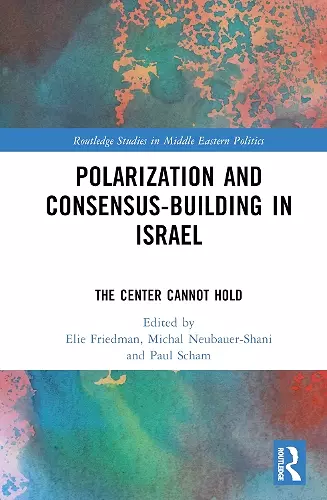Polarization and Consensus-Building in Israel
The Center Cannot Hold
Elie Friedman editor Paul Scham editor Michal Neubauer-Shani editor
Format:Hardback
Publisher:Taylor & Francis Ltd
Published:31st Jul '23
Currently unavailable, and unfortunately no date known when it will be back

This edited volume examines the most pressing social and political issues confronting Israel from a multidisciplinary perspective, focusing on the breakdown of social solidarity and the inability to formulate consensus.
The contributors – encompassing political scientists, historians, communication researchers, sociologists, economists, and educators – focus on specific topics that serve as exemplary cases of various trends of consensus and polarization. These trends are examined in the context of ideological, religious, economic, national, and ethnic cleavages. In addition, this volume analyzes how political actors’ preference for “non-decision” on various issues has resulted in the maintenance of a status quo, with cleavages or conflicts being neither mitigated nor polarized. Together, this collection of articles paints a picture of Israel as a state racked by increasing polarization along ideological and religious lines. It is argued that this difficulty in determining a consensual definition of the state threatens to destroy social solidarity in Israel altogether, a climate in which “the center cannot hold.”
This book is essential reading for anyone seeking to understand the major internal threats to Israel’s self-definition as a Jewish-democratic state and will also appeal to sociologists and political scientists interested in global polarization trends.
"Ever since its establishment, Israel has faced the simultaneous influence of conflicting centripetal and centrifugal political forces. In recent years both the nature and the impact of such tendencies seem to differ dramatically from the past. This important volume provides an interesting multidisciplinary perspective on these trends, challenging certain assumptions, and providing fresh ideas for consensus-building within the context of recent emboldened polarization."
Professor (Emeritus) Avraham Diskin, Department of Political Science, the Hebrew University of Jerusalem
"The issue examined in this volume – processes of polarization and agreement in Israeli society – is likely the most important issue for the future of the state, certainly within the context of domestic affairs. This book offers a range of viewpoints on the subject: from issues that are experiencing increasing polarization, to issues in which the phenomenon is lessening, to issues in which a strategy of indecision between the two poles is being implemented. The volume indicates that the issues for which polarization is deepening, and those for which a strategy of indecision is being implemented, are more substantial than those in which polarization is lessening – illustrating a phenomenon of an increasing breakdown of solidarity in Israeli society. This is an important and thought-provoking volume, particularly for readers who take an active part in public debate and have the ability to impact the future of the issues examined in this book."
Yair Sheleg, Research Associate at the Shalom Hartman Institute and journalist at Makor Rishon
"Paul Scham, Elie Friedman, and Michal Neubauer-Shani have edited a timely, thought-provoking book theorizing the conditions that foster consensus-building in polarized societies. With fifteen contributors from six different disciplinary backgrounds, the collection presents an exciting array of perspectives examining a range of issues and institutions within Israel, each located on the tectonic fault lines of ideological, religious, economic, national, and ethnic divides within the society. This book not only deepens the understanding of Israeli politics and society but serves as a lens through which many other political cultures, each facing similar challenges of increased polarization, can be analyzed and compared."
Professor Yael Aronoff, Professor of Political Science and International Relations at James Madison College; Director of the Michael and Elaine Serling Institute for Jewish Studies and Modern Israel; Serling Chair of Israel Studies, Michigan State University
ISBN: 9781032293318
Dimensions: unknown
Weight: 848g
350 pages